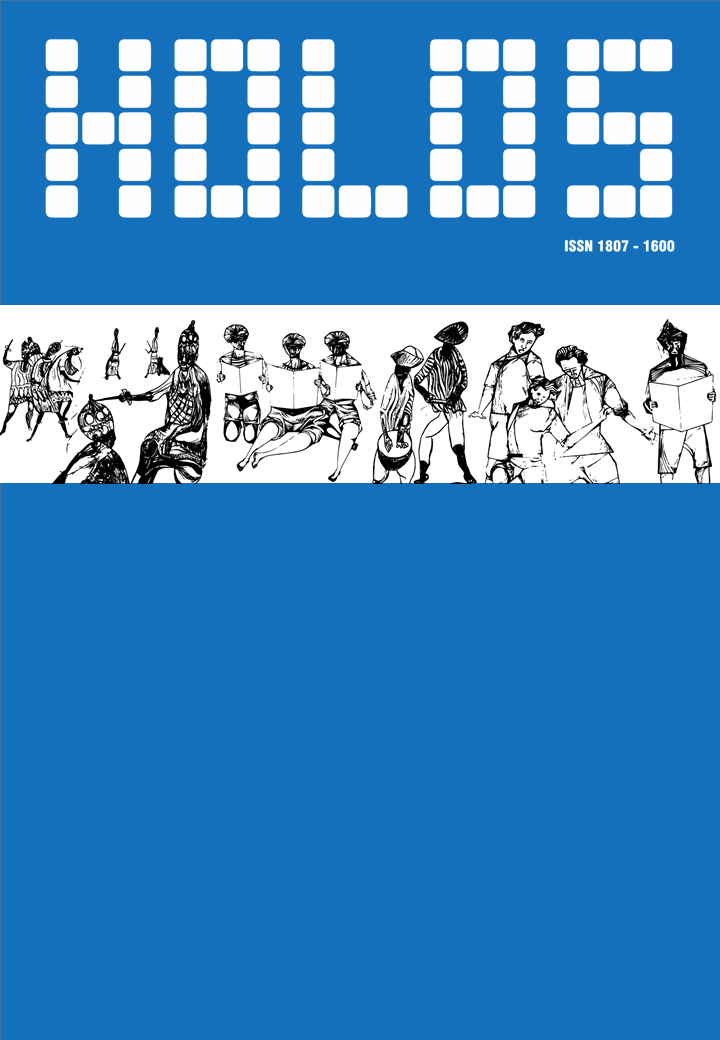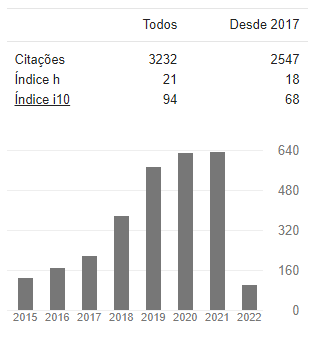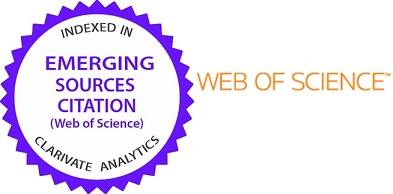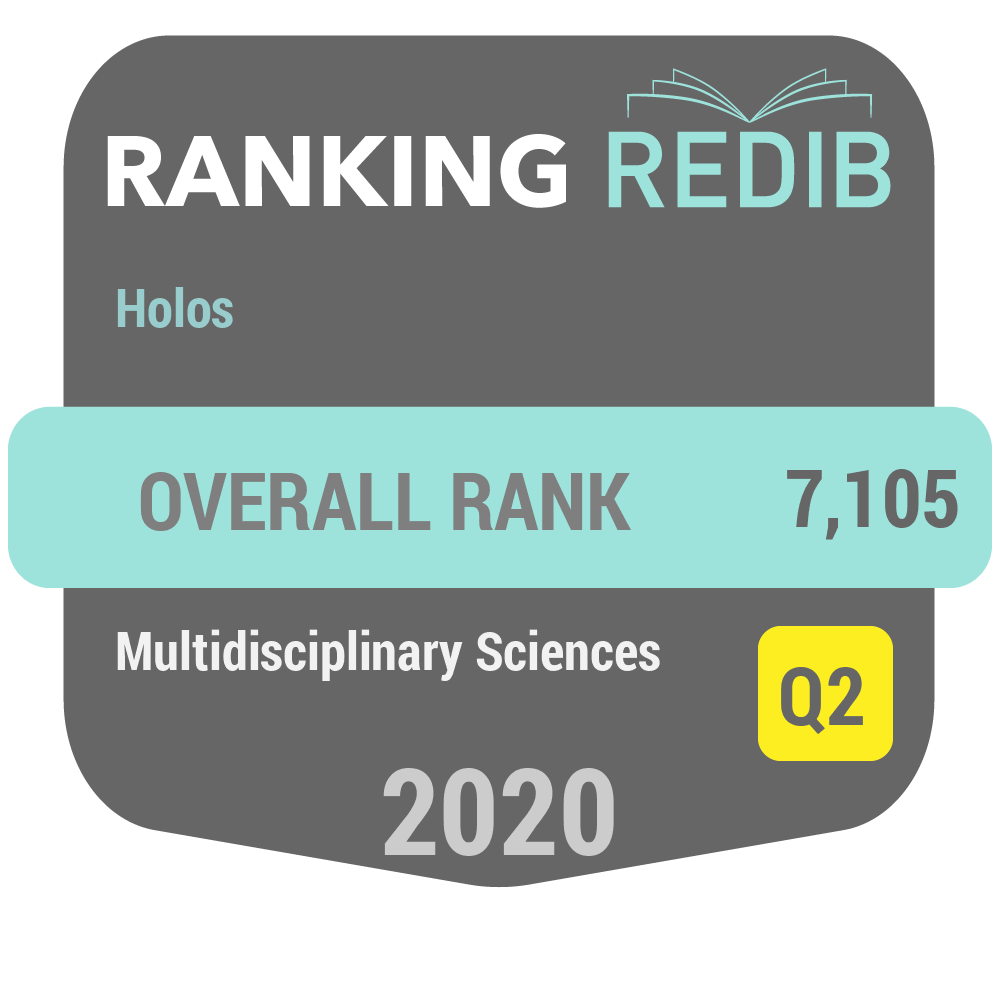BIBLIOMETRICS ANALYSIS OF THE LITERATURE ON HOW FIRMS ARE COPING COVID-19
DOI:
https://doi.org/10.15628/holos.2021.11735Palavras-chave:
Systematic literature review, Covid-19, firms, bibliometric analysis, research collaborationResumo
Different firms and their supply chains faced many global impacts with the COVID-19 pandemic. The purpose of this paper is to analyse the scientific production about companies and the Covid-19 pandemic through bibliometric indicators associated with the most prolific journals, authors, documents, countries and institutions. IEEE Engineering Management Review and Industrial Marketing Management were the most relevant academic journals, which indicates the adaptation of businesses and supply chain resilience as major tendencies. Ivanov and Kraus are the most relevant authors. This paper contributes with a mapping of scientific production regarding companies and COVID-19. The new found information provides a basis for future studies that can help researchers and managers to minimize the effects of the current global crisis.
Downloads
Referências
Altay, N., Gunasekaran, A., Dubey, R., & Childe, S. J. (2018). Agility and resilience as antecedents of supply chain performance under moderating effects of organizational culture within the humanitarian setting: a dynamic capability view. Production Planning and Control, 29(14), 1158–1174. https://doi.org/10.1080/09537287.2018.1542174
Aria, M., & Cuccurullo, C. (2017). bibliometrix: An R-tool for comprehensive science mapping analysis. Journal of Informetrics, 11(4), 959–975. https://doi.org/10.1016/j.joi.2017.08.007
Bennett, N. J., Finkbeiner, E. M., Ban, N. C., Belhabib, D., Jupiter, S. D., Kittinger, J. N., … Christie, P. (2020). The COVID-19 Pandemic, Small-Scale Fisheries and Coastal Fishing Communities. Coastal Management, 48(4), 336–347. https://doi.org/10.1080/08920753.2020.1766937
Cai, M., & Luo, J. (2020). Influence of COVID-19 on Manufacturing Industry and Corresponding Countermeasures from Supply Chain Perspective. Journal of Shanghai Jiaotong University (Science), 25(4), 409–416. https://doi.org/10.1007/s12204-020-2206-z
Chahrour, M., Assi, S., Bejjani, M., Nasrallah, A. A., Salhab, H., Fares, M. Y., & Khachfe, H. H. (2020). A Bibliometric Analysis of COVID-19 Research Activity: A Call for Increased Output. Cureus, (March). https://doi.org/10.7759/cureus.7357
Coelho, P., & Pinto, A. (n.d.). Thirty Years of Flexible Job-Shop Scheduling : A Bibliometric Study. 1, 1–12.
De Assunçâo, M. V. D., Medeiros, M., Trump, L. N. R., Paiva, I. V. L., & Paes, C. A. D. S. (2020). Resiliência Das Cadeias De Suprimentos Brasileira Com Os Impactos Da Covid-19. Holos, 36(5), 1–20. https://doi.org/10.15628/holos.2020.XXXX
Della Corte, V., Del Gaudio, G., Sepe, F., & Sciarelli, F. (2019). Sustainable tourism in the open innovation realm: A bibliometric analysis. Sustainability (Switzerland), 11(21), 1–18. https://doi.org/10.3390/su11216114
Dolgui, A., Ivanov, D., Potryasaev, S., Sokolov, B., Ivanova, M., & Werner, F. (2020). Blockchain-oriented dynamic modelling of smart contract design and execution in the supply chain. International Journal of Production Research, 58(7), 2184–2199. https://doi.org/10.1080/00207543.2019.1627439
Dolgui, A., Ivanov, D., & Sokolov, B. (2018). Ripple effect in the supply chain: an analysis and recent literature. International Journal of Production Research, 56(1–2), 414–430. https://doi.org/10.1080/00207543.2017.1387680
Dubey, R., Gunasekaran, A., & Childe, S. J. (2015). The design of a responsive sustainable supply chain network under uncertainty. International Journal of Advanced Manufacturing Technology, 80(1–4), 427–445. https://doi.org/10.1007/s00170-015-6967-8
Ellegaard, O., & Wallin, J. A. (2015). The bibliometric analysis of scholarly production: How great is the impact? Scientometrics, 105(3), 1809–1831. https://doi.org/10.1007/s11192-015-1645-z
Filimonau, V., Derqui, B., & Matute, J. (2020). The COVID-19 pandemic and organisational commitment of senior hotel managers. International Journal of Hospitality Management, 91(July), 102659. https://doi.org/10.1016/j.ijhm.2020.102659
Gallardo, E. C., de Arroyabe, J. C. F., & Arranz, N. (2020). Preventing internal COVID-19 outbreaks within businesses and institutions: A methodology based on social networks analysis for supporting occupational health and safety services decision making. Sustainability (Switzerland), 12(11). https://doi.org/10.3390/su12114655
Golan, M. S., Jernegan, L. H., & Linkov, I. (2020). Trends and applications of resilience analytics in supply chain modeling: systematic literature review in the context of the COVID-19 pandemic. Environment Systems and Decisions, 40(2), 222–243. https://doi.org/10.1007/s10669-020-09777-w
Hughes, P., Morgan, R. E., Hodgkinson, I. R., Kouropalatis, Y., & Lindgreen, A. (2020). A diagnostic tool to determine a strategic improvisation Readiness Index Score (IRIS) to survive, adapt, and thrive in a crisis. Industrial Marketing Management, 88(July), 485–499. https://doi.org/10.1016/j.indmarman.2020.05.020
Ivanov, D. (2017). Simulation-based ripple effect modelling in the supply chain. International Journal of Production Research, 55(7), 2083–2101. https://doi.org/10.1080/00207543.2016.1275873
Ivanov, D. (2018). Revealing interfaces of supply chain resilience and sustainability: a simulation study. International Journal of Production Research, 56(10), 3507–3523. https://doi.org/10.1080/00207543.2017.1343507
Ivanov, D. (2019). Disruption tails and revival policies: A simulation analysis of supply chain design and production-ordering systems in the recovery and post-disruption periods. Computers and Industrial Engineering, 127(September 2018), 558–570. https://doi.org/10.1016/j.cie.2018.10.043
Ivanov, D. (2020). Predicting the impacts of epidemic outbreaks on global supply chains: A simulation-based analysis on the coronavirus outbreak (COVID-19/SARS-CoV-2) case. Transportation Research Part E: Logistics and Transportation Review, 136(March), 101922. https://doi.org/10.1016/j.tre.2020.101922
Ivanov, D., Das, A., & Choi, T. M. (2018). New flexibility drivers for manufacturing, supply chain and service operations. International Journal of Production Research, 56(10), 3359–3368. https://doi.org/10.1080/00207543.2018.1457813
Juergensen, J., Guimón, J., & Narula, R. (2020). European SMEs amidst the COVID-19 crisis: assessing impact and policy responses. Journal of Industrial and Business Economics, 47(3), 499–510. https://doi.org/10.1007/s40812-020-00169-4
Ketchen, D. J., & Craighead, C. W. (2020). Research at the Intersection of Entrepreneurship, Supply Chain Management, and Strategic Management: Opportunities Highlighted by COVID-19. Journal of Management, 46(8), 1330–1341. https://doi.org/10.1177/0149206320945028
Kraus, S., Clauss, T., Breier, M., Gast, J., Zardini, A., & Tiberius, V. (2020). The economics of COVID-19: initial empirical evidence on how family firms in five European countries cope with the corona crisis. International Journal of Entrepreneurial Behaviour and Research, 26(5), 1067–1092. https://doi.org/10.1108/IJEBR-04-2020-0214
Liu, Y., Lee, J. M., & Lee, C. (2020). The challenges and opportunities of a global health crisis: the management and business implications of COVID-19 from an Asian perspective. Asian Business and Management, 19(3), 277–297. https://doi.org/10.1057/s41291-020-00119-x
Manolova, T. S., Brush, C. G., Edelman, L. F., & Elam, A. (2020). Pivoting to stay the course: How women entrepreneurs take advantage of opportunities created by the COVID-19 pandemic. International Small Business Journal: Researching Entrepreneurship, 38(6), 481–491. https://doi.org/10.1177/0266242620949136
Nenonen, S., & Storbacka, K. (2020). Don’t adapt, shape! Use the crisis to shape your minimum viable system – And the wider market. Industrial Marketing Management, 88(April), 265–271. https://doi.org/10.1016/j.indmarman.2020.05.022
Nenonen, S., Storbacka, K., Sklyar, A., Frow, P., & Payne, A. (2020). Value propositions as market-shaping devices: A qualitative comparative analysis. Industrial Marketing Management, 87(October 2019), 276–290. https://doi.org/10.1016/j.indmarman.2019.10.006
Nenonen, S., Storbacka, K., & Windahl, C. (2019). Capabilities for market-shaping: triggering and facilitating increased value creation. Journal of the Academy of Marketing Science, 617–639. https://doi.org/10.1007/s11747-019-00643-z
Okorie, O., Subramoniam, R., Charnley, F., Patsavellas, J., Widdifield, D., & Salonitis, K. (2020). Manufacturing in the Time of COVID-19: An Assessment of Barriers and Enablers. IEEE Engineering Management Review, 48(3), 167–175. https://doi.org/10.1109/EMR.2020.3012112
Olisah, C., Okoh, O. O., & Okoh, A. I. (2018). A bibliometric analysis of investigations of polybrominated diphenyl ethers (PBDEs) in biological and environmental matrices from 1992 – 2018. Heliyon, 4(11), e00964. https://doi.org/10.1016/j.heliyon.2018.e00964
Ramanan S., S., George, A. K., Chavan, S. B., Kumar, S., & Jayasubha, S. (2020). Progress and future research trends on Santalum album: A bibliometric and science mapping approach. Industrial Crops and Products, 158(July), 112972. https://doi.org/10.1016/j.indcrop.2020.112972
Saikia, K., Vallès, M., Fabregat, A., Saez, R., & Boer, D. (2020). A bibliometric analysis of trends in solar cooling technology. Solar Energy, 199(February), 100–114. https://doi.org/10.1016/j.solener.2020.02.013
Seetharaman, P. (2020). Business models shifts: Impact of Covid-19. International Journal of Information Management, 54(June), 1–4. https://doi.org/10.1016/j.ijinfomgt.2020.102173
Shahbaz, M., Bilal, M., Akhlaq, M., Moiz, A., Zubair, S., & Iqbal, H. M. N. (2020). Strategic measures for food processing and manufacturing facilities to combat coronavirus pandemic (COVID-19). Journal of Pure and Applied Microbiology, 14(2), 1087–1094. https://doi.org/10.22207/JPAM.14.2.01
Sharma, M., Luthra, S., Joshi, S., & Kumar, A. (2020). Developing a framework for enhancing survivability of sustainable supply chains during and post-COVID-19 pandemic. International Journal of Logistics Research and Applications, 0(0), 1–21. https://doi.org/10.1080/13675567.2020.1810213
Soares, P. B., Carneiro, T. C. J., Calmon, J. L., & Castro, L. O. da C. de O. (2016). Análise bibliométrica da produção científica brasileira sobre Tecnologia de Construção e Edificações na base de dados Web of Science TT - Bibliometric analysis of the Brazilian scientific production on Building and Construction Technologies in the Web of . Ambiente Construído, 16(1), 175–185. Retrieved from http://www.scielo.br/scielo.php?script=sci_arttext&pid=S1678-86212016000100175&lang=pt
Storbacka, K., & Nenonen, S. (2011). Scripting markets: From value propositions to market propositions. Industrial Marketing Management, 40(2), 255–266. https://doi.org/10.1016/j.indmarman.2010.06.038
Thorgren, S., & Williams, T. A. (2020). Staying alive during an unfolding crisis: How SMEs ward off impending disaster. Journal of Business Venturing Insights, 14(July), e00187. https://doi.org/10.1016/j.jbvi.2020.e00187
Tranfield, D., Denyer, D., & Smart, P. (2003). Towards a Methodology for Developing Evidence-Informed Management Knowledge by Means of Systematic Review* Introduction: the need for an evidence- informed approach. British Journal of Management, 14, 207–222.
Tsilika, T., Kakouris, A., Apostolopoulos, N., & Dermatis, Z. (2020). Entrepreneurial bricolage in the aftermath of a shock. Insights from Greek SMEs. Journal of Small Business and Entrepreneurship, 32(6), 635–652. https://doi.org/10.1080/08276331.2020.1764733
Verma, S., & Gustafsson, A. (2020). Investigating the emerging COVID-19 research trends in the field of business and management: A bibliometric analysis approach. Journal of Business Research, 118(July), 253–261. https://doi.org/10.1016/j.jbusres.2020.06.057
Waiho, K., Fazhan, H., Ishak, S. D., Kasan, N. A., Liew, H. J., Norainy, M. H., & Ikhwanuddin, M. (2020). Potential impacts of COVID-19 on the aquaculture sector of Malaysia and its coping strategies. Aquaculture Reports, 18, 100450. https://doi.org/10.1016/j.aqrep.2020.100450
Zhu, G., Chou, M. C., & Tsai, C. W. (2020). Lessons Learned from the COVID-19 pandemic exposing the shortcomings of current supply chain operations: A long-term prescriptive offering. Sustainability (Switzerland), 12(14), 1–19. https://doi.org/10.3390/su12145858









































